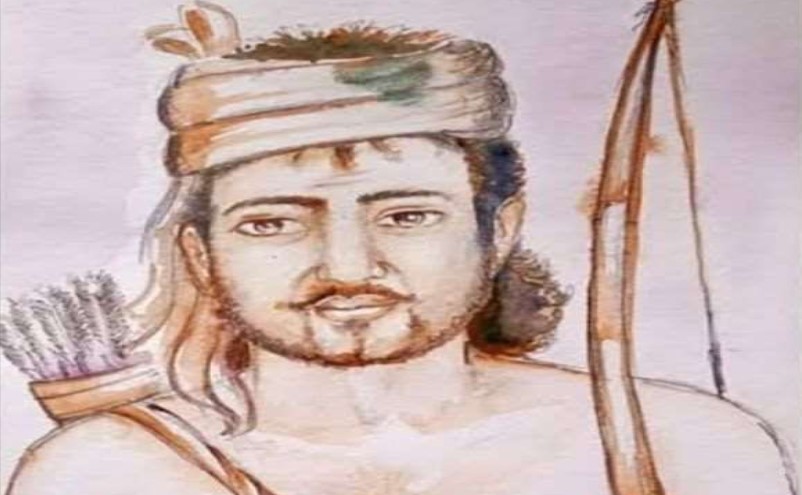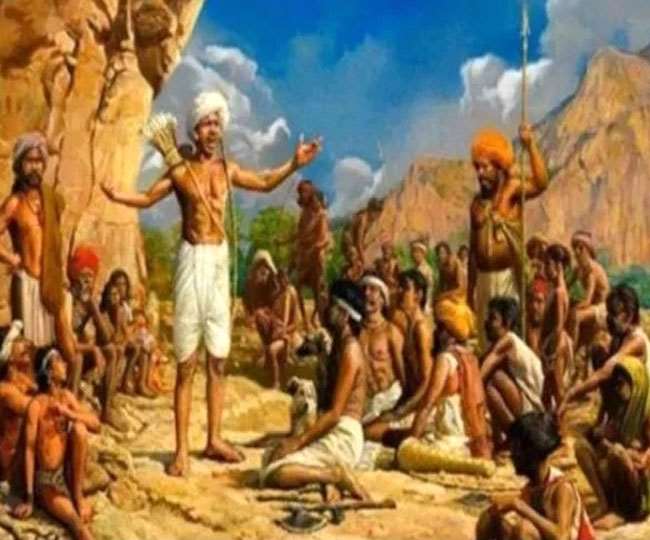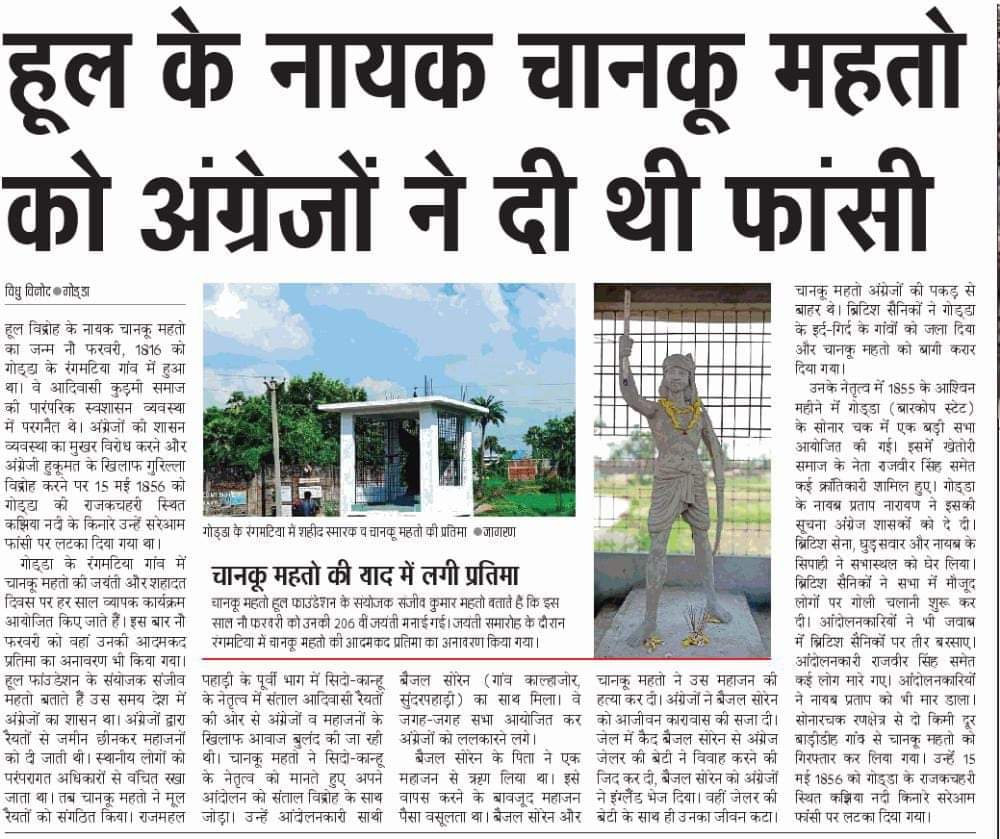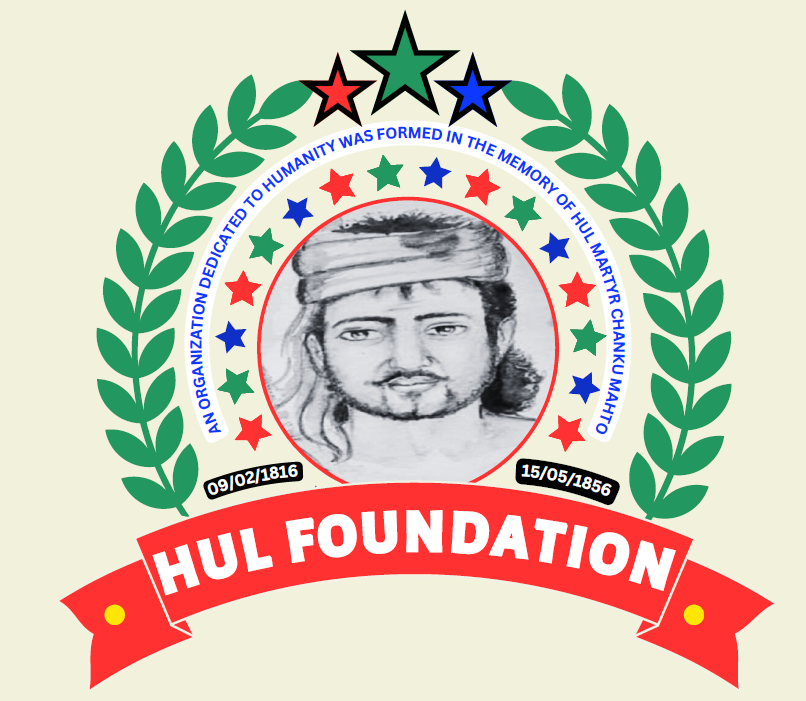About Chanku Mahto
About Chanku Mahto


Chunku Mahato (9 February 1816 – 15 May 1856) was a freedom fighter of British India belonging to the Kudmi Mahato community. Born in Rangamatia village of Godda, Jharkahnd in British India. He was one of the leaders of the Santhal rebellion, who organized the Mahatos to fight against the atrocities of the British.
Due to his skill and talent, Chunku Mahato became the head of the village and then also became the Parganait of the Pargana under the Kudmi self-governance system. The Company government had also entered Godda area. Here the British made an unexpected increase in the land tax in Godda. Those who were reluctant to pay taxes or were unable to pay due to poverty or low yield, were subjected to various kinds of tortures, their land was snatched away and given to outsiders.

His slogan
Aapon mati, Aapon dana, Pet kati nihi debo khajna
आपोन माटी, आपोन दाना, पेट काटी निही देबञ खजाना।
Attack on traditional self-governance
The British also attacked their traditional self-rule. Established a separate alternative government of the village. To run the government, taxes started being collected from the tribals through these officials. Along with the British rule, their atrocities and arbitrariness also increased. Then the tribals and indigenous people decided to respond. Revolt was the only way and for this, meetings started taking place in every village and people started uniting. Chanku Mahto took over the leadership.
Before the Hul Revolution, in 1853-54, he, along with his key colleagues Rajveer Singh, Bejal Soren, Bhagirath Manjhi, Hooghly Mahato, Budhu Rai, Balua Mahato, Rama Gop, Chalo Jolaha, Gando, Hardev Singh, launched a movement against it. Landlord and Company Government. , Here, Santals were also troubled by the exploitation of the company government. They were also planning to launch a mass movement.
Chanku Mahato joined this movement along with all his comrades. Sido-Kanhu fixed the date of the huge meeting or rather the rebellion as 30th June, 1855. People from entire Santal Pargana gathered in the meeting and revolted. Sham Pargana was leading the intellectual leadership of this movement. Thousands of tribals were killed in this rebellion. Many leaders of the movement survived. Even Chanku Mahato could not be caught by the police. Santali, Mahato and all the local castes contributed in the Hul Revolution and thousands of tribals were sacrificed.
Police was searching for Chanku Mahato. The game of hide and seek continued between the police and Chanku for months. There was a public meeting at Sonar Chak in the month of October 1855. Chanaku attended it and was addressing the people when a traitor Naib Pratap Narayan informed the British government about his presence. The British army acted quickly and surrounded Chanku Mahato from all sides and the war started. Chanku was injured in this attack, but his companions took him to a safe place.
The stove does not burn in the memory of Chanku Mahto
This was the second organized rebellion in Jharkhand after the Pahadia movement, which shook the British rule. Only after this Santal Pargana came into existence. A new law was made and facilities were provided to him, but Hul’s hero Chanku Mahato is still neglected at the government level. Chanaku Mahato was not given proper place in the history of the country, hence in the eyes of the government, like many tribal patriots of Jharkhand, Chanaku Mahato is also an unknown revolutionary.
But gratitude is being ignored at the local level and by many social scholars. Chunku Mahato is remembered on birth anniversaries, sacrifices and hool days in Jharkhand and surrounding states. His descendants and villagers organize several events in his memory every year. Even today the speaker’s stove does not light in many houses. Recently, a memorial of this revolutionary was made from a piece of soil of the fort and his life-size statue was installed on 9 February.
